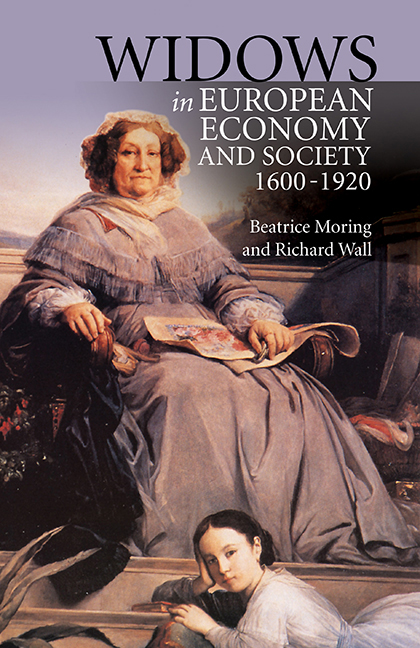Book contents
- Frontmatter
- Contents
- List of Plates
- List of Tables
- Acknowledgements
- Introduction
- 1 Widows and Poverty
- 2 Widows, Legislation and Property
- 3 Assessing the Assets of the Widow
- 4 Life Interest, Usufruct or Pension, The Mainstay of the Widow?
- 5 Urban Widows, Economy and Family
- 6 The Demography of Widowhood
- 7 Household Structure, Age, Social Status and Geography
- Conclusion
- Appendices
1 - Widows and Poverty
Published online by Cambridge University Press: 30 August 2017
- Frontmatter
- Contents
- List of Plates
- List of Tables
- Acknowledgements
- Introduction
- 1 Widows and Poverty
- 2 Widows, Legislation and Property
- 3 Assessing the Assets of the Widow
- 4 Life Interest, Usufruct or Pension, The Mainstay of the Widow?
- 5 Urban Widows, Economy and Family
- 6 The Demography of Widowhood
- 7 Household Structure, Age, Social Status and Geography
- Conclusion
- Appendices
Summary
WIDOWS have often been seen as the victims of male structures – poor, deprived and sidelined. Bridget Hair could be seen as a typical example. She supported her family of four children (four had died) by selling ribbons in 1820s Newcastle. She had been ill for three years with ‘inside disease’, and did not make enough to pay her rent of 6d a week. After pawning her bedding – ‘bed clothes and body clothes we have none’ – she turned to the poor relief authorities.
It has been assumed that when a woman was freed from the control of her husband, she lost the necessary economic protection. In her book about gender and poverty, Rachel Fuchs puts forward the view that widowhood and old age for nineteenth-century European women was beset by poverty, neglect by family and kin, and dependence on assistance from welfare institutions. The image of the lonely old widow reliant on poor relief still lives on, despite studies demonstrating the presence of family support for widows in Britain in the past, and evidence suggesting that assumptions about loneliness are wrong. There seems to be an unwillingness to accept that the key to understanding the causes of loneliness is to be found in demography and migration, not in the refusal of children to help their mothers.
Richard Wall has refuted the idea that the poor in the past survived mainly or only on outside support from parish and charities. Widows and abandoned women should not be seen as parasites on the welfare system. Undeniably, the process of industrialisation – in combination with restricted access, in rural areas, to commons – eroded opportunities for women to contribute to the family economy. However, in spite of the fact that the life of widows was hard and their economic status weak, they created survival strategies of which poor relief only constituted one part. In their efforts to survive, they also provided vital services like lodging, washing and cleaning, easing the transformation of society, an input that is difficult to measure and has therefore often been overlooked.
- Type
- Chapter
- Information
- Widows in European Economy and Society, 1600-1920 , pp. 19 - 66Publisher: Boydell & BrewerPrint publication year: 2017



